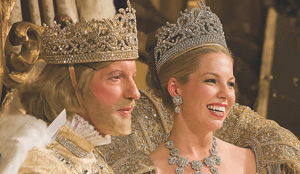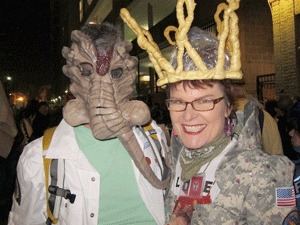New Orleans, despite its reputation for being open, friendly and welcoming, still what I call a “culture of clique.” I also call it the “I’m behind the police barricade and you’re not” syndrome. In other words, we’ll (ostensibly) welcome you with open arms, but if you try to change the way we’ve done things forever and a day—well, dear heart (and bless your heart), you’ll be shut out.
 I believe that this attitude is almost a corollary of the famed “Mardi Gras Mentality.” That terms can be construed to mean that we like to party and celebrate (yes, we do!), but it also means than there are certain clubs that not everyone is welcome to join. What’s even worse is that there are members of those clubs who literally look down their snobbish noses at those who want to participate in the fun. If you’re not a member of “their” club, well, forget it. In New Orleans, cliques rule.
I believe that this attitude is almost a corollary of the famed “Mardi Gras Mentality.” That terms can be construed to mean that we like to party and celebrate (yes, we do!), but it also means than there are certain clubs that not everyone is welcome to join. What’s even worse is that there are members of those clubs who literally look down their snobbish noses at those who want to participate in the fun. If you’re not a member of “their” club, well, forget it. In New Orleans, cliques rule.
Why do you think the krewes of Bacchus and Endymion started? Their members were probably a bit “nouveau riche” for the old old-line snobby carnival clubs. Muses welcomed young professional women. The other krewes, with the exception of Iris, did not accept women at all.
I feel sure, though, that these new carnival clubs will feel entitled to exclude certain new members who want to join. Thus the evolution of New Orleans Mardi Gras krewes, from Rex and Comus, to Bacchus and Endymion and Muses, to ‘Tit Rex, Krewe du Vieux and Chewbacchus. It’s an ever-evolving way to exclude the new guys from the “real” New Orleanians. Sigh.
I’ve seen the same thing apply in the local music community too. The Jazz Fest is probably the worst in this regard: witness the hordes of “behind the police barricade” friends of the Jazz and Heritage Board and Festival Production staff that populate the photo pits during Jazz Fest. I’ve had many professional photographers tell me they were shooed out of the pit because there were too many people there, most of whom had their point-and-shoots so they could get a souvenir photo of their favorite Fest performers.
I understand the mentality. I do. When you work hard and finally establish a viable, successful product, it’s human nature to want to demonstrate your ability and power by allowing friends behind the barricade. It’s simply largesse and allows its grantors feel their oats.
Let me note, though, that this sort of thing only applies to those who are behind the scenes, not the musicians themselves. The musicians here seem to be generous with each other and to those who’d like to jam with them across the board. Tells you something about our music scene, doesn’t it?
As I’ve stated many times in the past, I’m thrilled that we have new blood in the city. We tend to be navel-gazers in the Crescent City, convinced that everything here, quirky, byzantine, Third World, or wonderfully bizarre, is the way the rest of the world should be—and isn’t. It’s why we live in the “velvet-lined rut” of New Orleans.
But where is the balancing act that allows newcomers to the city into our hallowed, treasured, secretive ways of life? And a further question is, do the new folk understand why we love our lifestyle so? Are they willing to submit themselves to ways of life that are, shall we say, somewhat different from what they’ve been used to?
For example, now that the Bywater has been transformed from artsy-poor to hipster-chic (and a lot more expensive), will the new blood in the neighborhoods understand that their new home isn’t remotely like the city from which they emigrated?
Will they accept cronyist politics, byzantine customs, beer in go-cups, smoking in bars, music on the streets and from corners bars as part of the fabric of crazy New Orleans? Or will they protest and try to make New Orleans like every other city? God forbid.
Our culture of laissez-faire—and even cliques—is not something we want to lose. New Orleans is a continuing paradox of let’s keep everything the same versus let’s change it so that it feels like another place. We just have to insure that the new blood and the old blood respect each other, and that we don’t change our culture to the point that it may become homogenous as it is in the rest of the country.






